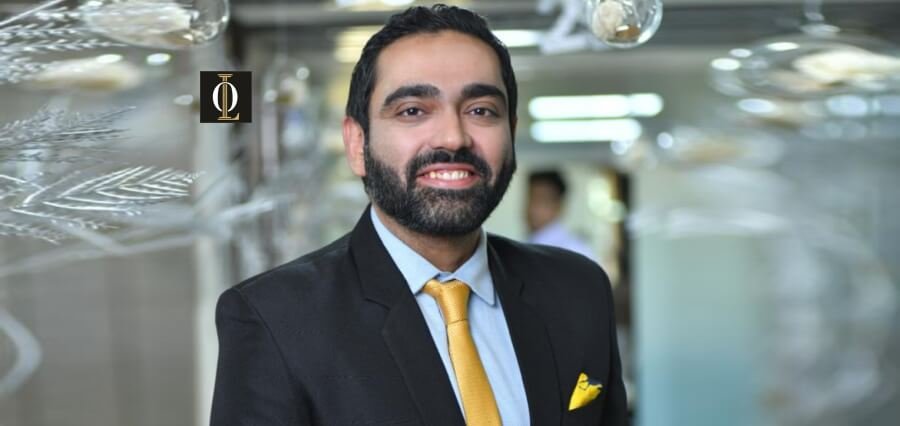Within India’s rapidly evolving legal ecosystem lies a voice of reason, resilience and reform, the legal professional Dikshat Mehra, whose journey has been far from conventional. A first-generation lawyer who created his own legacy on the grounds of self-reinvention and rock-solid commitment, Dikshat, who is Associate Partner at Rajani Associates, is now regarded as a stalwart in commercial litigation, arbitration, insolvency, and white-collar crime. This is not just the story of a lawyer, but one of an incensed thinkers who reinvented his destiny, one case at a time.
The Rise of a First-Generation Lawyer
It is not a narrative of generational privilege to which Dikshat owes his journey. A first-generation lawyer, he had a circuitous journey to the field. He originally wanted to go into law after college, but a technological bug kept him from doing so.
Depressed, he pursued a degree in business management and took up his family’s successful textile business. “But I never really lost the calling to law,” he says. And it was during his third year of management that he made his second attempt and never looked back.
His family, Guruji and his wife are the sources of his renewed belief and have stood by him, he shared. Today, when he counsels junior lawyers, especially those who don’t come from legal families, he tells them, “You may not come from a legacy, but if you have purpose, discipline and integrity, you will create your own.”
Sharpening the Edge of Understanding
For Dikshat, law is not a static collection of rules; it’s a dynamic ecosystem that grows and adapts with the people, businesses, and crises it’s meant to serve. Large swaths of his competitive edge don’t come from degrees or titles, but from the way he thinks, prepares, and goes about his job.
What defines his ethos? It’s a hungry mind and a strong conviction to be proactive rather than reactive.
“One does not always have to get into high-stakes things to be considered a good lawyer,” Dikshat says. “It’s how responsibly you serve the client, whether they are a startup with only a little money or a global giant. Anything you do is worth doing your best.”
This humility is complemented by discipline. In its own words, the magic formula is to learn, analyse, plan and execute. The courthouse is indeed the battlefield, but it is the quiet, concentrated work that occurs before, during, and after the trial that ultimately drives the results.
Litigator. Strategist. Timekeeper.
One untold story of Dikshat’s journey is his obsession with time, managing it, respecting it, and making the most of it. Early in his career, he realized that being a lawyer was as much about mastering time as mastering facts. The requirements of commercial disputes, arbitration, insolvency and regulatory appear to interlink frequently. Throw in drafting and client counsel, hearings, and follow-ups, and time becomes a battleground.
The key to success, Dikshat found, was to maintain a rhythm – Never micromanage, but always think ahead. He frequently tries to explain to younger associates that time is not just money; it is trust. “If the logic is sound, a client will forgive a judgment loss. But they will never forget a deadline missed,” he says.
This clockwork discipline helped him control not only his cases but also an expanding team of young litigators who were also following his process of document tracking, multi-step preparation, and real-time legal updating.
Commercial Litigation – More Than Just Courtroom Combat
When questioned about what skills are essential in commercial litigation, Dikshat names three key attributes: reading voraciously (he’s also a voracious reader), thinking strategically, and listening empathetically. “Law is like the ocean, vast and at times unpredictable,” he says.
“You have to swim in it with your eyes open, recognizing undercurrents and never afraid to dive deeply,” Dikshat expresses.
His early guides and managing Partner, Prem Rajani had told him – ‘ Read. Learn. Analyse. Then adapt.’ These are words that have become his daily practice. Whether he is steering clients through insolvency, advising resolution professionals, or representing them before tribunals (NCLT, NCLAT) for him, tight legal advice is as much about the client’s vision as it is about the relevant sections.
In the Trenches – Stories That Shaped a Career
At stake in every courtroom battle, or the rendering of any arbitration award, is a story. Whatever the outcome, the testing point is not only knowledge of the law but also character, composure, and creativity. For Dikshat Mehra, the quest for justice is marked by such pivotal moments, cases for which time was luxury, the stakes were high, and the law was changing in real time.
One such file remained deeply imprinted on his mind: the corporate hijacking that went so serendipitously wrong. Thus, the whole quarrel broke out in a day and could not be suspended by any means. Dikshat and his team toiled through the clock, notching up a comprehensive legal action in 72 straight hours —something remarkable yet historical.
“Winning that mattered wasn’t just about merit. It was about readiness, team coordination, and razor-sharp focus. We didn’t just represent, we rescued,” Dikshat shares.
In a similar matter of enforcing a foreign judgment in India, Dikshat had to navigate an intricate maze of international legal doctrines, procedural formalities, and local prejudices. The matter required balancing the Indian justice system with international law, and here, navigating between Indian and international laws, one didn’t just need knowledge but also diplomacy and finesse.
“You’re not just arguing law. You’re also negotiating perspectives,” he says.
Those stories illustrate the range of Dikshat’s legal skills, not only as a technician of law, but also as a tactician, a listener and often, an off-the-books crisis manager for clients who come to his door with pressing and life-altering problems.
Leadership in the Time of Crisis – The Pandemic Years
The COVID-19 pandemic was more than a public health crisis; it was a litigation tsunami, causing chaos, spawning new sources of conflict, and leading firms into uncharted territory. Courts went virtual. Contracts collapsed. Industries reeled.
It was a time for Dikshat that was all about testing every element of leadership. From overseeing the renegotiation of clients’ contractual obligations to orchestrating urgent insolvency proceedings during the lockdown era, he would grow into a vital lifeline for businesses and institutions trying to navigate the unknown.
“I believe our duty as lawyers doubled during the pandemic. We had to provide not just legal guidance, but emotional steadiness and creative solutions,” he reflects.
Through an internal focus, he collaborated with his team at Rajani Associates and implemented measures focused on continuity, mentoring, and well-being. Weekly virtual check-ins were not only about cases; they also turned into support circles. Under his tutelage, junior lawyers learned to adjust to virtual hearings, often by receiving real-time feedback. “The crisis redefined leadership for me. It taught me that clarity and compassion are inseparable,” he says.
Law as a Moral Engine – Justice Beyond Judgment
Reinforcing Dikshat’s faith is his conviction that the law is more than just a procedure; it is moral architecture. He believes that laws are the promises we make to ourselves as a society. As lawyers, we are the keepers of those promises.
His approach has a strong moral aspect and is united with practical realism. He doesn’t offer magic wands. Instead, he constructs practical roadmaps for his clients, ones that are grounded in law, empathy, and transparency.
“People often come to us when they are most vulnerable. Being a lawyer means protecting not just rights but dignity,” he emphasises.
Nowhere is that moral compass more important than when it comes to white-collar crimes or fraud investigations. While representing clients before agencies such as the CBI, SFIO, and ED, he ensures that a fair chance is given, advising clients to comply with their corporate duties.
His philosophical anchor is that it’s not might that delivers justice, but preparedness, honesty, and reality.
Technology and the Legal Balance Sheet
While AI often sparks debate in legal circles, Dikshat sees it as a boon, not a threat. “AI is here to support, not replace, lawyers,” he asserts. In his practice, he has observed how tools for document review, legal research, proofreading, and scheduling have decreased time pressure and increased precision.
But he’s fast to add a caution: “Emotion often has a subliminal but vital role in litigation. AI can optimize, but it can’t empathize.” He views AI as an equalizer, an ally for augmenting lawyers’ abilities, rather than as a device that can ever supplant a lawyer’s human judgment, ethical sensibilities, or relational thinking.
Reforming Arbitration from the Inside Out
It’s one of the issues Dikshat is passionate about, namely the need to enhance India’s arbitration landscape. Intended as a faster and cheaper alternative to trials, arbitration has been hindered in practice by procedural deadlocks.
“The first roadblock is the appointment of arbitrators. If parties can’t agree, they must go to the High Court or Supreme Court, where the matter gets stuck for months. This defeats the very purpose of arbitration,” Dikshat explains.
His recommendation is to streamline the institutional appointment mechanism, which would eliminate court backlogs and speed up proceedings.
Furthermore, Dikshat also recommends a reconsideration of evidence rules in arbitration. “There is no difference between an arbitration and a court here, and that is nowhere close to being cost-effective, like it is in international arbitrations,” he said, based on his international exposure.
“Arbitration should… be flexible, fast, and responsive to the needs of investors and businesses in modern business transactions,” he stresses.
Many Forums have been incorporated, he said, are a step in the right direction. With increasing backing from legal practitioners and amendments facilitating reform, he is hopeful that India can develop into a genuine global arbitration hub.
Cross-Cultural Practice – Global Thinking, Local Sensitivity
As an advisor in cross-border issues, he brings a unique international perspective to his practice. Dikshat knows that legal systems, although they have a universal form, are shaped by local culture, language, and the dynamics of trust.
From dealing with foreign awards, shareholder disputes offshore, or cross-jurisdictional insolvency matters, they have seen the need to take local practices into account, whilst complying with life expectations.
His exposure to international arbitration norms has inspired him to passionately champion the integration of the best practices into the national systems. “India has the brainpower to be a distant international dispute resolution center, but we need to simplify the process for access and promote transparency, cross-border literacy,” he says.
It is this mix of cosmopolitan insight and grassroots understanding that makes him a bridge between foreign clients and Indian legal institutions.
Voice in the Industry – Media, Policy & Thought Leadership
Dikshat isn’t restricted to courtrooms. He is also a leading light in the debates about legal reform, notably in relation to commercial litigation, arbitration and insolvency.
His articles are regularly published in The Economic Times, Business Today, Bar & Bench and Banking Frontier, which reflect his love for development-oriented legal discussions. From explaining the finer details of the Arbitration and Conciliation Amendment Bill to demystifying the SEBI rules, he makes a genuine attempt to make the narratives more understandable and engaging. Dikshat has also been recognized as a Rising Star in the year 2022 by the Governor of Maharashtra.
He also participates in interviews and panel discussions, such as his feature on Legal Desire, to break down legal developments in a manner that’s easily digestible for the commoner.
In an increasingly connected world, Dikshat thinks lawyers need to be public educators who can help shape businesses and individuals to understand how the law is changing in response to economics, ethics, and global norms.
Empathy in Action: Giving Back to the Profession
Dikshat still manages to find time to give back to society, despite his hectic schedule. He also counsels prospective law students and young lawyers, especially those from first-generation backgrounds.
“I know what it’s like to enter the legal world without legacy or networks. I try to be the mentor I never had in my early days,” he shares.
His counsel in informal mentorship circles encompasses a range of topics, from career strategy to practical litigation training and wellness in the legal profession. He is a strong advocate for psychological health, specifically in stressful settings such as the law.
He further advocates for projects to raise legal literacy among minority groups, enabling them to understand their rights in areas such as tenancy, scams, digital security, and consumer rights.
Unfinished Business, Unwritten Chapters
Despite his successes, Dikshat believes that he is still just getting started. He remains active before the Bombay and Delhi High Courts, the Supreme Court, and various tribunals on hot topics, including wilful defaulter litigations, foreign judgment enforcement, insolvency and arbitration enforcement proceedings.
His eyes are still fixed on the future: constructing better, more inclusive systems, mentoring the next generation of lawyers, and changing the way India looks at arbitration and mediation.
As he says, “Law has given me a platform. Now I want to use that platform to give back.”
Dikshat is not one to rest on his laurels despite all the accolades he receives. Going forward, he wants to play a bigger part in influencing policy, the future of legal education and, maybe, one day in the effort to reform the judiciary.
“I want to be part of the generation that doesn’t just argue the law, but updates it, explains it, and humanizes it,” he says.
“Legal literacy should not be a luxury,” he says, “it should be a civic right.”
The Man Behind the Practice
Dikshat Mehra is a lawyer who serves with intelligence, leads with integrity, and lives with purpose. His story isn’t only one of triumph; it’s one of sincerity. Not simply about legal genius, but emotional intelligence. It is not just a question of power, but of principle.
In a sector where prestige is commonly granted, Dikshat reminds us that it is service, humility, and change that, in fact matters. From arguing in court to mentoring a junior lawyer to guiding a business through insolvency, he works with the unassuming thought that justice is actual justice, not a theoretical concept; it is still worth fighting for. Before I end, I want to take a moment to express my sincere gratitude to all the mentors at Rajani Associates and Senior Advocates at the Bombay High Court and Delhi High Court who have guided me both in the past and those I continue to learn from today. Each one has played a vital role in shaping how I approach challenges, grow professionally, and stay grounded in my values.
Read Also : Devina Das: The Unconventional Force Behind Global Legal Evolution





